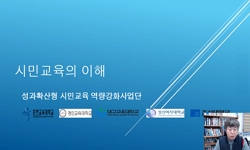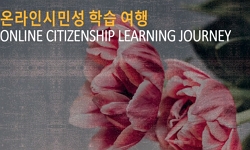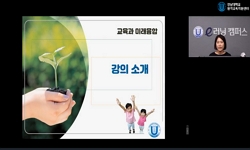Discourses on civic education are becoming increasingly popular. Various analyses and approaches are being made, but the key to civic education discourse is how it is related to existing education and what and how it is intended to be taught. This the...
http://chineseinput.net/에서 pinyin(병음)방식으로 중국어를 변환할 수 있습니다.
변환된 중국어를 복사하여 사용하시면 됩니다.
- 中文 을 입력하시려면 zhongwen을 입력하시고 space를누르시면됩니다.
- 北京 을 입력하시려면 beijing을 입력하시고 space를 누르시면 됩니다.

아리스토텔레스의 ‘시민의 덕’ 개념에 기반을 둔 시민교육 = Citizenship Education based on Aristotle’s Concept ‘Civic Virtue’
한글로보기https://www.riss.kr/link?id=A108530391
-
저자
김상섭 (영남대학교)
- 발행기관
- 학술지명
- 권호사항
-
발행연도
2023
-
작성언어
Korean
-
주제어
인간의 덕 ; 시민의 덕 ; 시민교육 ; 덕 교육 ; 시민적 친애 ; human virtue ; civic virtue ; citizenship education ; virtue education ; civic friendships
-
등재정보
KCI등재
-
자료형태
학술저널
- 발행기관 URL
-
수록면
1-23(23쪽)
- 제공처
-
0
상세조회 -
0
다운로드
부가정보
다국어 초록 (Multilingual Abstract)
Aristotle’s concept of civic virtue goes beyond virtue education aimed at the completion of virtuous beings or individual existence and moves towards the complete realization of communal existence. In that sense, Aristotle says, “man is a political (communal) being.” At the same time, he clarifies the meaning of this proposition: humans are beings who use language and judge what is right or wrong. He further defines that humans are political (communal) beings. In this respect, civic education that considers political (communal) beings should include politics, rhetoric, and poetics in addition to ethics and should take the form of public education provided to everyone in the same way.
Discourses on civic education are becoming increasingly popular. Various analyses and approaches are being made, but the key to civic education discourse is how it is related to existing education and what and how it is intended to be taught. This thesis examines the possibility of securing the uniqueness and distinctiveness of civic education, with the suspicion that civic education is a headline that resets existing education. To meet this intention, I discuss the possibility of civic education based on Aristotle’s concept of “civic virtue.” In his book “Politics,” Aristotle clearly distinguishes the civic virtues that citizens of a community should have from the universal virtues that humans should possess as rational beings. Depending on how one understands and interprets such a distinction, civic education that seeks to cultivate civic virtues can secure independence and uniqueness or can be regarded as an extension of virtue education that cultivates universal human virtues. To clarify this discussion, this thesis specifically analyzes Aristotle’s practical philosophies, such as Politics, Rhetoric, and Poetics, in addition to The Nicomachean Ethics.
Aristotle’s concept of civic virtue goes beyond virtue education aimed at the completion of virtuous beings or individual existence and moves towards the complete realization of communal existence. In that sense, Aristotle says, “man is a political (communal) being.” At the same time, he clarifies the meaning of this proposition: humans are beings who use language and judge what is right or wrong. He further defines that humans are political (communal) beings. In this respect, civic education that considers political (communal) beings should include politics, rhetoric, and poetics in addition to ethics and should take the form of public education provided to everyone in the same way.
국문 초록 (Abstract)
시민교육 담론이 붐을 일으키고 있다. 다양한 분석과 접근이 이루어지고 있는 것은 환영할 만한 일이다. 담론의 다양성에도 불구하고, 시민교육담론이 공통적으로 다뤄야 할 문제들 중의 하...
시민교육 담론이 붐을 일으키고 있다. 다양한 분석과 접근이 이루어지고 있는 것은 환영할 만한 일이다. 담론의 다양성에도 불구하고, 시민교육담론이 공통적으로 다뤄야 할 문제들 중의 하나는 그것이 기존의 교육과 어떤식으로 연관되며 무엇을 어떻게 교육하려고 하는가라는 문제라고 할 수 있다. 이 논문은, 시민교육이 기존의 교육을 재설정하는 표제어에 불과하다는 의구심을 품고, 시민교육의 고유성과 독자성을 확보할 수 있는 가능성을점검하고자 한다. 그러한 의도를 충족시키기 위해 아리스토텔레스의 ‘시민의 덕’ 개념에 기반을 둔 시민교육의 가능성을 논의하고자 한다. 아리스토텔레스는 『정치학』에서 공동체의 시민이 갖춰야 할 시민의 덕을 이성적 존재로서 인간이 갖추어야 할 보편적인 덕과 명백하게 구별하고 있다. 그러한 구별을 어떻게 이해하고 파악하느냐에따라, 시민의 덕을 함양하고자 하는 시민교육은 독자성과 고유성을 확보할 수도 있고, 인간의 보편적인 덕을 함양하는 덕 교육의 연장선에 서게 될 수도 있다. 그러한 논의를 전개하기 위해서 이 논문은 구체적으로 『니코마코스 윤리학』 외에 『정치학』과 『수사학』 및 『시학』 등 아리스토텔레스의 실천철학을 참조하고자 한다.
참고문헌 (Reference)
1 정철민, "한국 시민교육에 대한 비판적 고찰: 시민교육의 목적과 내용을 중심으로" 한국교육철학학회 39 (39): 175-192, 2017
2 송현정 ; 윤노아, "학교 민주시민교육의 개념과 목표에 대한 델파이 조사 연구" 한국사회과교육학회 53 (53): 83-116, 2021
3 이범웅, "프랑스 시민교육의 탐색을 통한 한국 민주시민교육의 함의에 대한 고찰" 한국초등도덕교육학회 (75) : 265-297, 2021
4 한나 아렌트, "칸트 정치철학 강의" 푸른숲 2002
5 강대현 ; 은지용, "초․중등 사회과 민주시민교육의 현황과 과제" 한국사회과교육학회 54 (54): 221-245, 2022
6 장의관, "좋은 사람과 좋은 시민의 긴장: 아리스토텔레스 정치공동체의 가능성과 한계" 한국정치학회 45 (45): 5-29, 2011
7 아리스토텔레스, "정치학" 도서출판 길 2017
8 한나 아렌트, "인간의 조건" 한길사 2017
9 에티엔 발리바르, "우리, 유럽의 시민들? : 세계화와 민주주의의 재발명" 후마니타스 2010
10 손병석, "왜 친애(philia)가 정의보다 더 중요한가? : 아리스토텔레스의 정치적 친애(politikē philia)와 호모노이아(homonoia) 그리고 덕친애의 관계를 중심으로" 철학연구회 (131) : 1-29, 2020
1 정철민, "한국 시민교육에 대한 비판적 고찰: 시민교육의 목적과 내용을 중심으로" 한국교육철학학회 39 (39): 175-192, 2017
2 송현정 ; 윤노아, "학교 민주시민교육의 개념과 목표에 대한 델파이 조사 연구" 한국사회과교육학회 53 (53): 83-116, 2021
3 이범웅, "프랑스 시민교육의 탐색을 통한 한국 민주시민교육의 함의에 대한 고찰" 한국초등도덕교육학회 (75) : 265-297, 2021
4 한나 아렌트, "칸트 정치철학 강의" 푸른숲 2002
5 강대현 ; 은지용, "초․중등 사회과 민주시민교육의 현황과 과제" 한국사회과교육학회 54 (54): 221-245, 2022
6 장의관, "좋은 사람과 좋은 시민의 긴장: 아리스토텔레스 정치공동체의 가능성과 한계" 한국정치학회 45 (45): 5-29, 2011
7 아리스토텔레스, "정치학" 도서출판 길 2017
8 한나 아렌트, "인간의 조건" 한길사 2017
9 에티엔 발리바르, "우리, 유럽의 시민들? : 세계화와 민주주의의 재발명" 후마니타스 2010
10 손병석, "왜 친애(philia)가 정의보다 더 중요한가? : 아리스토텔레스의 정치적 친애(politikē philia)와 호모노이아(homonoia) 그리고 덕친애의 관계를 중심으로" 철학연구회 (131) : 1-29, 2020
11 김상돈, "아리스토텔레스의 시민적 친애" 한국윤리학회 1 (1): 43-70, 2020
12 손윤락, "아리스토텔레스의 시민 교육에서 덕 - 성격과 음악" 한국동서철학회 (69) : 31-49, 2013
13 장지원, "아리스토텔레스의 공교육론: 정치학을 중심으로" 한국교육철학학회 40 (40): 151-170, 2018
14 손병석, "아리스토텔레스 「정치학」 연구. 플라톤과의 대화" 한국문화사 2019
15 아리스토텔레스, "시학" 문예출판사 2002
16 김주환, "시민교육의 한국적 특수성과 그 이율배반적 측면에 대한 검토: 시민성 개념을 중심으로" 한국교육철학학회 44 (44): 31-51, 2022
17 아리스토텔레스, "수사학/시학" 도서출판 숲 2017
18 곽덕주, "민주 시민성의 조건으로서 성숙한 자기 관계: 타자 인정에의 욕구의 교육적 지위를 중심으로" 한국교육철학학회 41 (41): 1-22, 2019
19 아리스토텔레스, "니코마코스 윤리학" 문예출판사 2006
20 플라톤, "고르기아스" 아카넷 2021
21 Westheimer, J., "What kind of citizen? : The politics of educating for democracy" 41 (41): 237-269, 2004
22 Friedrich Schiller, "Schillers Werke. Nationalausgabe 20. Band" 309-412, 1962
23 Aristotle, "Politics" Oxford University Press 1988
24 Dewey, J., "Democracy and Education" The MacMillan Company 1916
25 Mclaughlin, T. H., "Citizenship, diversity and education : a philosophical perspective" 21 (21): 235-250, 1992
26 정윤경, "Biesta의 민주시민교육 접근 탐색" 교육연구소 28 (28): 55-82, 2022
27 서영식, "21세기 민주시민교육과 철학의 기여 – 플라톤과 아리스토텔레스의 시민교육 담론과 연계해서" 한국동서철학회 (98) : 553-574, 2020
동일학술지(권/호) 다른 논문
-
- 한국교육철학학회
- 김재영
- 2023
- KCI등재
-
- 한국교육철학학회
- 이유정
- 2023
- KCI등재
-
기섹케(H. Giesecke)의 교육 개념에 나타난 반교육학(反敎育學)의 교육적 의미 재구성
- 한국교육철학학회
- 이주호
- 2023
- KCI등재
-
탈진실 시대에 진실 가르치기 : 마르쿠스 가브리엘의 신실재론을 중심으로
- 한국교육철학학회
- 최승현
- 2023
- KCI등재




 KCI
KCI KISS
KISS






